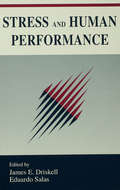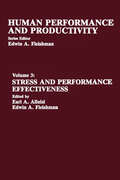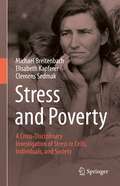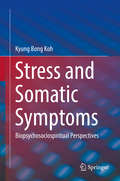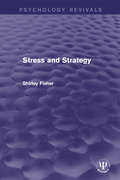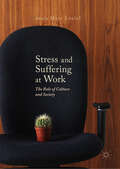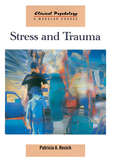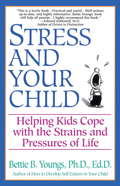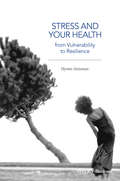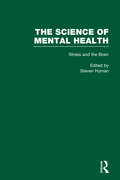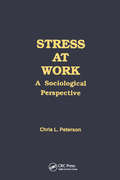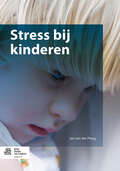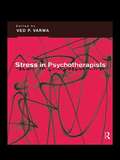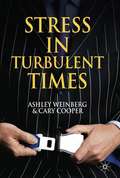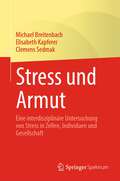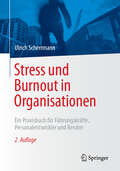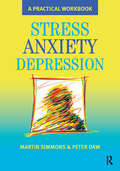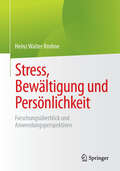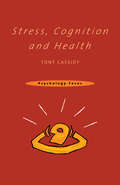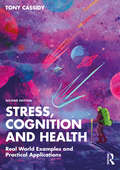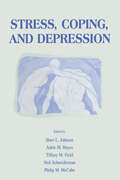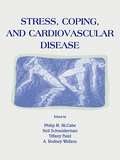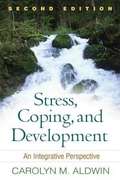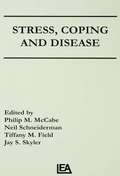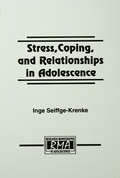- Table View
- List View
Stress and Human Performance (Applied Psychology Series)
by Eduardo Salas James E. DriskellThe pace of life in our high technology world has quickened. Industries that do not become more efficient, often by requiring a faster production turnaround with less slack, are superseded. Because of this, workers face an environment in which they must perform under more time pressure and under greater task load, in which stress is more prevalent, and in which consequences of poor performance are more critical than ever before. The dominant, if unstated, psychoanalytic paradigm underlying much stress research over the past fifty years has led to an emphasis on coping and defense mechanisms and to a preoccupation with disordered behavior and illness. Accordingly, almost any book with "stress" in the title will invariably devote a considerable amount of pages to topics such as stress-related disorders, clinical interventions, stress and coping, psychopathology, illness, and health issues. This book presents basic and applied research that addresses the effects of acute stress on performance. There are a large number of applied settings that share the commonalities of high demand, high risk performance conditions, including aviation; military operations; nuclear, chemical, and other industrial settings; emergency medicine; mining; firefighting; and police work, as well as everyday settings in which individuals face stressors such as noise, time pressure, and high task load. This book focuses directly on the effects of acute stress-- defined as intense, novel stress of limited duration--on performance. The effects of stress on task performance, decision making, and team interaction are discussed, as well as the interventions used to overcome them.
Stress and Performance Effectiveness: Volume 3
by Earl A. Alluisi and Edwin A. FleishmanFirst published in 1982. Routledge is an imprint of Taylor & Francis, an informa company.
Stress and Poverty: A Cross-Disciplinary Investigation of Stress in Cells, Individuals, and Society
by Clemens Sedmak Michael Breitenbach Elisabeth KapfererThe word stress is everywhere and highly overused. Everyone is stressed, it seems, all the time. Looking into the meaning of stress in the natural science and the humanities, this book explores cellular stress as cause of and in correlation with what humans experience as stress. When do we psychologically feel stress and when do we show physiological evidence of stress in our brain? Stress is a deviation from what feels normal and healthy. It can be created by social or economic factors and become chronic, which has substantial impacts on the individual and society as a whole. Focusing on poverty as one chronic inducer of stress, this book explores how the lack of pressure-free time, the hardships and unpredictability of everyday life and a general lack of protection lead to destructive toxic stress. This pressure affects cognitive and social functioning, brain development during childhood and may also result in premature aging. How can the sciences inform our understanding of and our response to stress? What can be done about toxic stress both on a personal level and in terms of structures and policies? The book is written for anyone interested in stress, its causes and consequences, and its relationship to poverty.
Stress and Somatic Symptoms: Biopsychosociospiritual Perspectives
by Kyung Bong KohThis book focuses on the assessment and treatment of patients with somatic symptoms, based on biopsychosociospiritual model. Specific assessment skills and treatment techniques are required to approach them effectively. A broad spectrum of knowledge about stress is also needed because stress is closely related to the onset and course of disorders with somatic symptoms.This book consists of four parts. Part 1 ‘Stress’ explores stress, vulnerability, and resilience; intermediate mechanisms between stress and illnesses such as psychoendocrinology and psychoimmunology; the measurement of stress; and the relationship between stress and accidents.Part 2 ‘Somatization’ deals with the concept, mechanisms, assessment, and treatment of somatization. In addition, somatic symptom and related disorders in DSM-5 is included. However, the approach to chronic pain is separately added to this part because pain is a major concern for patients with these disorders. Part 3 ‘Specific physical disorders’ mainly deals with common and distressing functional physical disorders as well as major physical disorders. Therapeutic approach for individuals at risk of coronary heart disease is also included.Part 4 ‘Religion, spirituality and psychosomatic medicine’ emphasizes the importance of a biopsychosociospiritual perspective in an approach for patients with somatic symptoms, especially depressed patients with physical diseases and patients with terminal illnesses because of the growing need for spirituality in such patients. This book explores stress and a variety of issues relevant to the assessment and treatment of disorders with somatic symptoms in terms of biopsychosociospiritiual perspectives. It will be of interest to researchers and healthcare practitioners dealing with stress, health and mental health.
Stress and Strategy (Psychology Revivals)
by Shirley FisherOriginally published in 1987, this title is concerned with the association between stress and control, and the implications for strategic response. It aims both to provide an up-to-date, comprehensive account of research in the area of stress for the advanced student and to develop a new synthesis of ideas leading to a cognitive model of stress and illness. The book reflects the idea that responses to stressful conditions are likely to be strategic, designed in order to achieve control in different ways. Concepts such as responsibility, instrumentality and predictability are discussed in an attempt to make the relationship between stress and control explicit. Different forms of the exercise of control are identified as features of strategy. A cognitive model of illness is developed, which assumes that the characteristics of strategies specified in terms of modes of control determine the features of ‘arousal pathology’ via hormone routes and thus influence the risk of illness. This differs from existing models at the time, which emphasise environmental properties such as incongruence, status inconsistency or ‘rule breakdown’ as determinants. A ‘constrained resource’ approach is emphasised, in which cognitive style and particular experiences exercise constraint on the range of strategies available in cognition. Hence these factors influence the risk of different kinds of ill health when life stresses are encountered. The book provides details of evidence and theory as well as new ideas and models. It will still be of interest to students of psychology, social science and medicine, who are concerned with stress and its relationship with human and health efficiency.
Stress and Suffering at Work: The Role of Culture and Society
by Marc LoriolThis edited collection explores different strands of social constructionist theory and methods to provide a critique of the prevailing discourse of work stress, and introduces a radical new approach to conceptualizing suffering at work. Over the last three decades, stress and other forms of suffering at work (including burn-out, bullying, and issues relating to work-life balance) have emerged as important social and medical problems in Western countries. However, stress is a contested category, not (as many argue) a well-defined clinical, biological and psychological state that affects people in the same way in different cultures and at different times. Thus, a social constructionist perspective helps to shed light on new approaches to prevention and interventions of work stress. This book will be of great interest for students and scholars of sociology, anthropology, social history, history of science, psychology, communication and management, as well as to practitioners (doctors and psychologists), policy makers and employers.
Stress and Trauma (Clinical Psychology: A Modular Course)
by Patricia A. ResickStress and Trauma provides a well-written, accessible overview of traumatic stress studies. It reviews the full range of clinical disorders that may result from extreme stress, with particular emphasis on the most common disorder - post-traumatic stress disorder (PTSD). The book reviews research on the prevalence of trauma and the prevalence of relevant disorders following trauma. It goes on to look at psychological theories of stress and trauma, the biology of stress and trauma reactions, and the factors prior to, during and after traumatic events that place people at particular risk for the development of psychological problems. The book goes on to look at treatment of trauma-related psychological problems, and covers the use of medication and a range of psychological treatments. Different types of therapy are described and research findings on these approaches are reviewed. Stress and Trauma will provide a valuable overview of the area for advanced undergraduates, early post-graduate training, and mental health professionals seeking an update of recent developments.
Stress and Your Child
by Betty YoungsGive your children back their childhood. We like to think of childhood as a carefree, relaxed time of life, but the truth is, children today experience more stress than ever before: parents' fast-paced lifestyles, the frequent breakup of families, urban crime, schools in turmoil, and a host of other problems. However, according to Bettie B. Youngs, Ph.D., Ed.D, one of America's most admired experts on child psychology, children by mastering skills of coping and self-awareness--can actually draw vitality from stress and channel it to promote health, fitness, and self-esteem.Stress and Your Child helps parents understand the pressures that their children face and explores the essential ways to reduce, manage, and prevent stress from birth to age twenty. Dr. Youngs leads parents through each stage of their child's emotional and social development and teaches them: How to recognize the physical and emotional signs of stress in children- How to understand school-related stress, including social pressures, personal safety, and test-taking- How parental stress affects children- and what parents can do to alleviate it- How teaching kids self-esteem and emotional honesty can help them cope wth stress- How diet, physical activity, and realistic schedules can help to minimize stress in children. Stress and Your Child is an invaluable parenting guide. No family can afford to be without it!
Stress and Your Health: From Vulnerability to Resilience
by Hymie AnismanStress and Your Health: From Vulnerability to Resilience presents an evidence-based evaluation of the various effects of stress, along with methods to alleviate distress and stress-related illnesses. Examines myriad stressor effects and proven ways to alleviate stress in our lives Covers a wide range of stressor-related topics including therapeutic strategies to deal with stress and factors that hinder treatment of stress Makes difficult biochemical and immunological concepts accessible to a non-specialist audience Addresses many of the factors that cause individuals to be more vulnerable to the impact of stressors and at increased risk for pathology
Stress and the Brain: The Science of Mental Health
by Steven HymanFirst published in 2002. This is Volume 9 of a collection of ten works on the science of mental health. This volume in the series focuses on issues related to stress and the brain. Although stress affects many other aspects of physiology, they are beyond the scope of this volume. The volume begins with a seminal work by Selye describing the stress response, an adaptive response that permits an organism not only to survive but also to cope with the stressor.
Stress at Work: A Sociological Perspective (Policy, Politics, Health and Medicine Series)
by Chris PetersonThis book provides a theoretical background to occupational stress, and traces the early work of Hans Selye and the development of bio-physiological, psychological and then sociological models of stress. It also reports on a study of stress and ill-health in a large manufacturing organisation in Australia. It examines the effects of stress, low self-esteem and poor mastery on psychological outcomes and ill-health symptoms.
Stress bij kinderen
by Jan Van PloegEen toegankelijk en informatief geschreven handboek voor voornamelijk zorgprofessionals die te maken krijgen met kinderen van 0 tot 18 jaar die gebukt gaan onder stress en trauma. De tweede doelgroep bestaat uit ouders en studenten. Het zijn niet alleen extreme situaties die bij kinderen veel stress kunnen veroorzaken; ook kleine dagelijkse weerkerende negatieve gebeurtenissen kunnen veel stress met zich meebrengen.
Stress in Psychotherapists
by Ved P. VarmaThose who spend most of their time dealing with other people's stress are most vulnerable to stress themselves. Stress in Psychotherapists highlights the pressures experienced by psychotherapists and examines how the effects vary according to the problems they treat, the settings in which they work and their professional and personal development. Written by a team of experienced practitioners this book is important reading for all those in psychotherapy training and practice.
Stress in turbulent times
by Ashley Weinberg Cary CooperStress isundoubtedly one of the major work-related illness and is even more likely in times of economic uncertainty and downturn. Theauthors assess the psychological challenges created by instability and uncertainty and provide a survival toolkit that shows the reader how to combat stress in their own lives.
Stress und Armut: Eine interdisziplinäre Untersuchung von Stress in Zellen, Individuen und Gesellschaft
by Clemens Sedmak Michael Breitenbach Elisabeth KapfererDas Wort Stress ist allgegenwärtig und ist ein Modewort geworden. Jeder ist gestresst, so scheint es, und das fortwährend. Dieses Buch befasst sich mit der Bedeutung von Stress in den Natur- und Geisteswissenschaften und untersucht zellulären Stress als Ursache für Stress und im Zusammenhang mit dem, was Menschen als Stress erleben. Wann empfinden wir in psychologischem Sinn Stress und wann zeigen wir physiologische Anzeichen von Stress in unserem Gehirn?Stress ist eine Abweichung von dem, was sich „normal“ und gesund anfühlt. Er kann durch soziale oder ökonomische Faktoren ausgelöst werden und kann chronisch werden, was erhebliche Auswirkungen auf den einzelnen Menschen und auf die Gesellschaft als Ganzes hat. Dieses Buch konzentriert sich auf Armut als eine chronische Ursache von Stress und untersucht, wie der Mangel an druckfreier Zeit, die Entbehrungen und die Unvorhersehbarkeit des Alltags sowie ein allgemeiner Mangel an Schutz zu destruktivem toxischem Stress führen. Dieser permanente Druck beeinträchtigt die kognitiven und sozialen Funktionen, die Gehirnentwicklung in der Kindheit und kann auch zu vorzeitiger Alterung führen. Was können die Wissenschaften für unser Verständnis von und unsere Reaktion auf Stress leisten? Was kann gegen toxischen Stress getan werden, sowohl auf persönlicher Ebene als auch in Bezug auf Strukturen und politische Maßnahmen?Das Buch richtet sich an alle, die sich für Stress, seine Ursachen und Folgen sowie für den Zusammenhang von Stress und Armut interessieren.
Stress und Burnout in Organisationen: Ein Praxisbuch für Führungskräfte, Personalentwickler und Berater
by Ulrich ScherrmannDieses Buch hilft Führungskräften, Organisationsberatern und Coaches, Stress und Burnout im Unternehmen zu erkennen und zu bekämpfen. Es setzt dabei nicht nur bei individuellen Faktoren an, sondern auch bei dem, was wirklich hilft: Es erklärt organisationale Faktoren von Burnout in einem verständlichen, systemischen Organisationsmodell. Neben Grundwissen zu Ursachen von Burnout werden Tipps für einen adäquaten Umgang gegeben, die u.a. ein neues Paradigma von Gesundheit in Betrieben und Organisationen und das Thema Prävention umfassen. Der Praxisteil des Buches vermittelt konkrete Methoden und Checklisten für Führungskräfte sowie für die ganze Organisation. Erfahrungsberichte aus der Beratungsarbeit runden dieses praxisorientierte Handbuch ab.
Stress, Anxiety, Depression: A guide to humanistic counselling and psychotherapy
by Martin Simmons Peter DawAllowing clients to work on their own problems and at their own pace, this excellent title recognises that solving personal problems is a skill to be learnt just like any other. It teaches the reader the necessary skills and then guides the use of those skills through organised action plans and practical self help programmes. It is excellent for helping to build confidence in relationships, communicating with others and understanding personal choice. It helps the user overcome guilt, anger, moodiness, depression, stress and anxiety. It encourages a more relaxed approach and helps to handle conflict at home and in work. All of the exercises, questionnaires and action plans can be freely photocopied.
Stress, Bewältigung und Persönlichkeit: Forschungsüberblick und Anwendungsperspektiven
by Heinz Walter KrohneDieses Buch liefert einen Brückenschlag zwischen den Erfahrungen von Menschen mit Stress und Stressbewältigung, der neuesten Forschung in diesem Bereich und den Anwendungsmöglichkeiten der Praxis. Sein wesentliches Thema ist die Bedeutung von Unterschieden zwischen Menschen im Erleben und Bewältigen von Belastungen. Daraus folgt die Notwendigkeit, die präventive und therapeutische Praxis im Hinblick auf das Erreichen einer wirksamen Stressbewältigung an diese Unterschiede anzupassen. Betrachtet man diese (relativ stabilen) Unterschiede zwischen Menschen, so ergibt sich für die Praxis eine wesentliche Konsequenz: Eine generell (also für alle Betroffenen) empfohlene und praktizierte Form der Bewältigung (z.B. Ablenkung, Entspannung, Achtsamkeit auf Prozesse im eigenen Körper) kann zwar bei bestimmten Personen hilfreich sein, bei anderen Menschen aber eher negativ wirken. So lassen sich Personen prinzipiell in zwei Gruppen einordnen: Vermeidende Personen haben die Tendenz, belastenden Ereignissen bzw. Erlebnissen aus dem Weg zu gehen, etwa indem sie die Schwere der Belastung herunterspielen oder sich gar nicht erst mit ihr befassen. Überwachern geht es hingegen darum, möglichst viel Information über eine Belastung (z.B. eine bevorstehende Operation) zu erhalten, um sich so sicherer zu fühlen und die Situation besser kontrollieren zu können. Methoden zur Messung dieser Merkmale werden beschrieben sowie Forschungen vorgestellt, die die jeweils optimale Bewältigung bei vermeidenden bzw. überwachenden Personen beschreiben. Auf der Grundlage dieser Thematik werden Möglichkeiten zur praktischen Anwendung vorgestellt, die auf Erkenntnissen aus diesen Forschungen beruhen. Dabei konzentriert sich das Buch auf drei Felder: • Gesundheit mit den beiden Themen Bewältigung und körperliche Gesundheit sowie psychologische Behandlung von Patienten bei medizinischen Eingriffen • Stressbewältigung und Leistungsverhalten • Prävention im Hinblick auf den Einfluss der Sozialisation (speziell der elterlichen Erziehung) auf die Entwicklung der Stressbewältigung beim Kind Die Zielgruppen • Studierende, Lehrende und Praktiker der (Gesundheits-)Psychologie, Sozial-, Gesundheits- und Erziehungswissenschaften, die Informationen zu hier bedeutsamen wissenschaftlichen Themen (u.a. Gesundheitsverhalten und -erziehung, Leistungsanforderungen, Sozialisationsprozesse) suchen. • Personen, die für die Bewältigung ihrer alltäglichen Belastungen das Angebot der vielen hierzu vorliegenden Ratgeber nicht befriedigt und nach auf neuesten wissenschaftlichen Erkenntnissen basierenden, Informationen suchen
Stress, Cognition and Health (Psychology Focus Ser.)
by Tony CassidyStress Cognition and Health examines the key issues in the psychology of stress and health, bringing together a wide range of material generally not found in a single text. It looks at how the external world makes demands upon individuals - potentially causes of stress - while at the same time providing them with resources to cope with stress. It covers topics such as work and employment, families, commuting, large-scale disasters and daily hassles and considers how these impact on biological processes through effects on the immune system.
Stress, Cognition and Health: Real World Examples and Practical Applications
by Tony CassidyThe new edition of this bestselling textbook provides a comprehensive overview of the latest research on stress and health, moving beyond the former deficit model to a resource growth model. It examines all aspects of the topic, from how the external world and the impact of technology makes demands upon individuals, through biological and psychological processes, to outcomes in terms health and wellbeing. The process is set within a dynamic, multilevel systems and developmental lifespan perspective. The book includes a history of the evolution of stress research and the biological systems and immune responses that translate external pressures into health outcomes. It considers the role of personality and cognition in terms of appraisal and coping strategies set within a social ecology of power and support. The role of positive psychology in terms of resilience, psychological capital, and self-compassion brings the area up to date in considering the benefits as well as the threats of stress on health and wellbeing. An integration of issues of importance in stress research is provided with some suggested guidelines for both research and practice. Issues around prevention and intervention are discussed to reduce stress and increase resilience in families, schools, workplaces and communities, and suggestions for the future development of the field are presented. With an engaging style, the book is equally accessible to the lay person and the scientist, the practitioner and the academic. Providing a basis for further exploration of the vast area of stress and health, it is valuable reading for undergraduate and postgraduate students, and those working in organisations with an interest in understanding and preventing or alleviating stress.
Stress, Coping and Depression (Stress and Coping Series)
by Neil Schneiderman Sheri L. Johnson Adele M. Hayes Tiffany M. Field Philip MccabeStress, Coping, and Depression is the latest volume based on the Annual Stress and Coping Conference held at the University of Miami. In this timely collection, leading researchers offer a variety of new perspectives on depression. They review the social, biological, and psychological processes that put adults and their children at risk and discuss innovative treatments grounded in empirical studies. Research findings are integrated across domains to construct more effective models of etiology and intervention. The contributors' thought-provoking ideas will provide inspiration for the ongoing efforts addressing the problems associated with this devastating disorder. Content highlights include: * novel information processing approaches to depression; * an overview of the neural pathways guiding moods; * empirical approaches for the treatment of bipolar disorders; * integrated models of biological and environmental influences on the transmission of depression to children; and * new perspectives on the relationship between personality and stress.
Stress, Coping, and Cardiovascular Disease (Stress and Coping Series)
by Neil Schneiderman Philip M. McCabe Tiffany Field A. Rodney WellensThe latest volume in the series based on the Annual Stress and Coping Symposia held at the University of Miami, Drs. McCabe, Schneiderman, Field, and Wellens bring together an outstanding group of researchers to examine the relationship between bio-behavioral and social factors and heart disease. Highlights of the book include an in-depth look at the latest research on: * basic physiological processes in cardiovascular reactivity to stress; * pathophysiological mechanisms in cardiovascular disease; * ethnic differences in cardiovascular regulation; * psychosocial influences on cardiovascular function/disease; and * Behavioral interventions designed to treat cardiovascular disorders. The goal of Stress, Coping, and Cardiovascular Disease is to provide a solid empirical foundation on the relationship between stress and cardiovascular disease so as to stimulate further research into the pathophysiology and treatment of the leading cause of death in industrialized countries.
Stress, Coping, and Development, Second Edition
by Carolyn AldwinHow do people cope with stressful experiences? What makes a coping strategy effective for a particular individual? This volume comprehensively examines the nature of psychosocial stress and the implications of different coping strategies for adaptation and health across the lifespan. Carolyn M. Aldwin synthesizes a vast body of knowledge within a conceptual framework that emphasizes the transactions between mind and body and between persons and environments. She analyzes different kinds of stressors and their psychological and physiological effects, both negative and positive. Ways in which coping is influenced by personality, relationships, situational factors, and culture are explored. The book also provides a methodological primer for stress and coping research, critically reviewing available measures and data analysis techniques. New to This Edition Incorporates advances in concepts, tools, and data. Chapters addressing physiology and physical health. Expanded coverage of sociocultural and religious aspects of coping, and of childhood, young adulthood, and mid-life. New perspectives on emotion regulation and stress-related growth.
Stress, Coping, and Disease (Stress and Coping Series)
by Jay S. Skyler Neil Schneiderman Tiffany M. Field Philip M. McCabeThe third volume based on the annual University of Miami Symposia on Stress and Coping, this book focuses on the role of biophysical factors in four of the greatest health problems confronting us today: cardiovascular disease, diabetes, cancer, and the AIDS epidemic. In each of these disorders, stress is seen as a contributing factor that interacts with other variables such as genetic influences or constitutional factors. Accordingly, the behavioral treatments discussed are often designed to change lifestyles, reduce stress, or improve adherence to therapeutic regimens. This volume provides a solid theoretical base which should stimulate further research into biobehavioral mechanisms and treatments for the disorders it examines.
Stress, Coping, and Relationships in Adolescence (Research Monographs in Adolescence Series)
by Inge Seiffge-KrenkeUnique and comprehensive, this volume integrates the most updated theory and research relating to adolescent coping and its determinants. This book is the result of the author's long interest in, and study of, stress, coping, and relationships in adolescence. It begins with an overview of research conducted during the past three decades and contrasts research trends in adolescent coping in the United States and Europe over time. Grounded on a developmental model for adolescent coping, the conceptual issues and major questions are outlined. Supporting research ties together the types of stressors, the ways of coping with normative and non-normative stressors, and the function that close relationships fulfill in this context.More than 3,000 adolescents from different countries participated in seven studies that are built programmatically on one another and focus on properties that make events stressful, on coping processes and coping styles, on internal and social resources, and on stress-buffering and adaptation. A variety of assessment procedures for measuring stress and coping are presented, including semi-structured interviews, questionnaires, and content analysis. This multimethod-multivariate approach is characterized by assessing the same construct via different methods, replicating the measures in different studies including cross-cultural samples, using several informants, and combining standardized instruments with very open data gathering.The results offer a rich picture of the nature of stressors requiring adolescent coping and highlight the importance of relationship stressors. Age and gender differences in stress appraisal and coping style are also presented. Mid-adolescence emerges as a turning point in the use of certain coping strategies and social resources. Strong gender differences in stress appraisal and coping style suggest that females are more at risk for developing psychopathology. The book demonstrates how adolescents make use of assistance provided by social support systems and points to the changing influence of parents and peers. It addresses controversial issues such as benefits and costs of close relationships or the beneficial or maladaptive effects of avoidant coping. Its clear style, innovative ideas, and instruments make it an excellent textbook for both introductory and advanced courses. Without question, it may serve as a guide for future research in this field.This book will be of value to researchers, practitioners, and students in various fields such as child clinical and developmental psychology and psychopathology.
